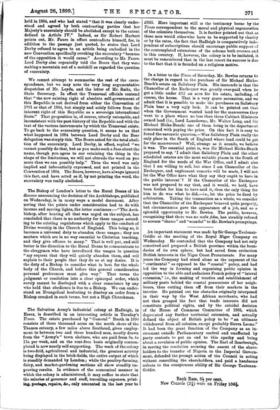An important statement was made by Sir George Taubman- Goldie
at the meeting of the Royal Niger Company on Wednesday. He contended that the Company had not only conceived and prepared a British province within the boun- daries of its own sphere, but had saved from extinction British interests in the Niger Coast Protectorate. For many years the Company had stood alone as the exponent of the " continental " as opposed to the " coastal" policy, and had led the way in forming and organising public opinion in opposition to the able and audacious French policy of "lateral extension," i.e., the making of treaties and establishment of military posts behind the coastal possessions of her neigh- bours, thus cutting them off from their markets in the interior. He pointed out the obstacles originally interposed in their way by the West African merchants, who had not then grasped the fact that trade interests did not constitute political rights, and by the suicidal decision of the House of Commons Committee of 1865, which deprecated any further territorial extension, and actually defined the object of British policy to be " an ultimate withdrawal from all colonies, except probably Sierra Leone." It had been the great function of the Company as an in- strument outside Parliamentary control and unaffected by party contests to put an end to this apathy and bring about a revulsion of public opinion. The Earl of Scarbrough,
in moving the resolution securing the assent of the share- holders to the transfer of Nigeria to the Imperial Govern- ment, defended the prompt action of the Council in acting without consulting the shareholders, and paid a handsome tribute to the conspicuous ability of Sir George Taubman. Goldie.


































 Previous page
Previous page